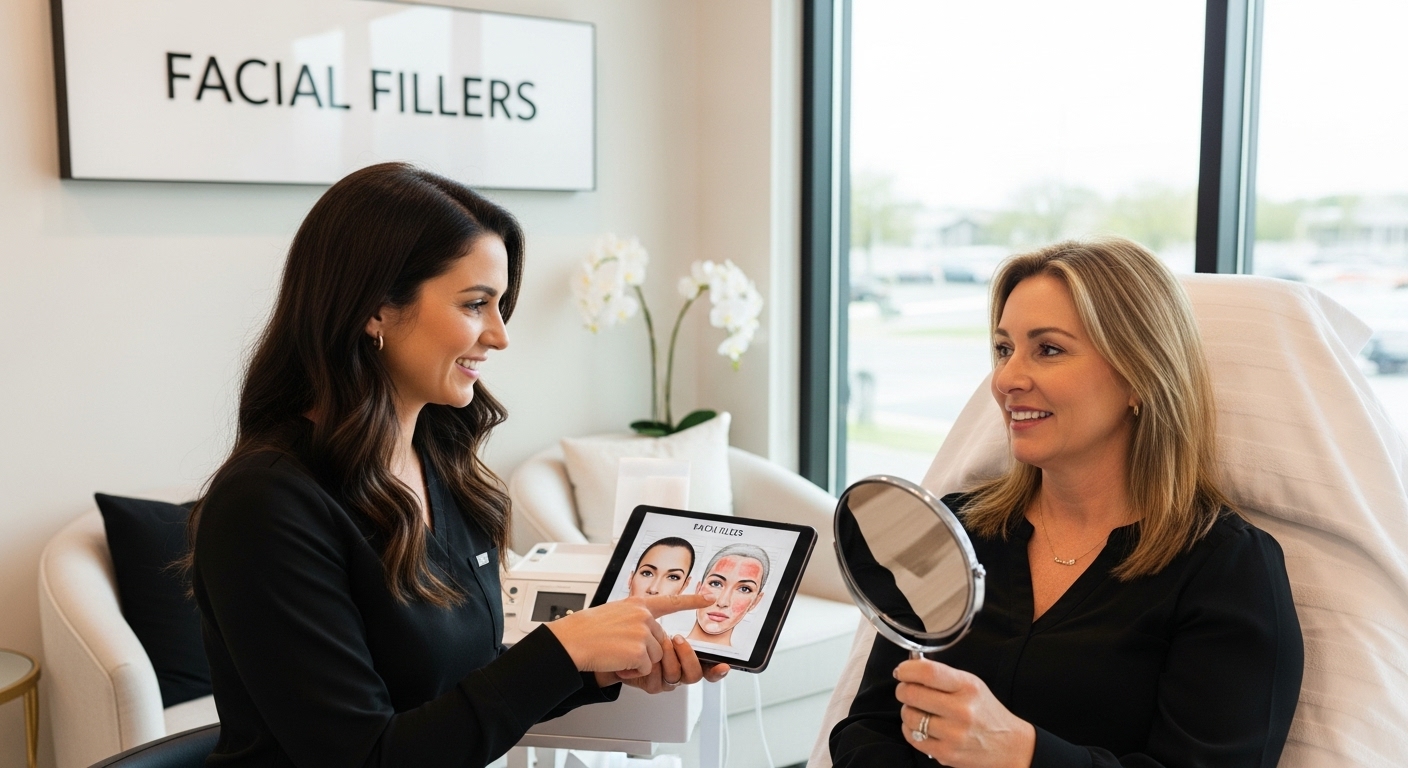Discover what are facial fillers, their uses, benefits, and how they enhance your beauty and confidence.
Facial fillers have become the go-to choice for anyone wanting to smooth wrinkles or regain youthful contours without surgery. The surprise comes with just how common these procedures are now. Over 3.4 million facial filler treatments were performed in the United States in 2020 alone. Still, what most people do not realize is that the science behind facial fillers has evolved far beyond simple wrinkle reduction. These treatments now blend advanced chemistry and precision artistry to achieve natural-looking results that leave people guessing.
Table of Contents
- Defining Facial Fillers: What Are They?
- The Importance of Facial Fillers in Aesthetic Treatments
- How Facial Fillers Work: The Science Behind the Beauty
- Types of Facial Fillers: Exploring Your Options
- Potential Risks and Considerations of Facial Fillers
Quick Summary
| Takeaway | Explanation |
|---|---|
| Facial fillers restore volume and smooth wrinkles. | These injectable treatments fill in lost volume, addressing signs of aging and enhancing facial contours. |
| Hyaluronic acid fillers are the most common. | They provide instant hydration and volume, ideal for fine lines, with results lasting 6-18 months. |
| Professional assessment is essential for safety. | An experienced practitioner is crucial to minimize risks and ensure effective results tailored to individual needs. |
| Temporary side effects are usually mild. | Expect swelling and tenderness after treatment; these symptoms typically resolve quickly. |
| Facial fillers boost self-esteem and confidence. | Beyond aesthetic improvements, they can enhance overall emotional well-being, making individuals feel more empowered about their appearance. |
Defining Facial Fillers: What Are They?
Facial fillers represent a sophisticated cosmetic treatment designed to restore volume, smooth wrinkles, and enhance facial contours. According to Mayo Clinic, these injectable gel-like substances are strategically placed beneath the skin to address signs of aging and improve aesthetic appearance.
The Science Behind Facial Fillers
At their core, facial fillers are biodegradable materials professionally injected to rejuvenate and reshape facial features. They work by supplementing the natural volume loss that occurs with aging, targeting specific areas like cheeks, lips, and around the mouth. These treatments utilize various substances that integrate seamlessly with the body’s existing tissue, providing immediate and natural-looking results.
Key characteristics of facial fillers include:
- Temporary and reversible aesthetic enhancement
- Minimally invasive procedure with minimal recovery time
- Customizable treatment targeting specific facial regions
Types and Applications
Different facial fillers serve unique purposes, ranging from fine line reduction to deep tissue volume restoration. Medical professionals select fillers based on individual patient needs, considering factors like skin type, age, and desired outcomes. Learn more about our personalized cheek enhancement treatments that can help you achieve your aesthetic goals.
While facial fillers offer remarkable rejuvenation potential, they require professional assessment and precise application to ensure safe and effective results. The goal is always to create subtle, natural-looking improvements that enhance your inherent beauty without appearing artificial or overdone.
The Importance of Facial Fillers in Aesthetic Treatments
Facial fillers have transformed aesthetic medicine by offering sophisticated, minimally invasive solutions for age-related volume loss and skin rejuvenation. According to research published in the National Center for Biotechnology Information, these treatments provide significant aesthetic improvements with remarkable psychological benefits for patients seeking non-surgical facial enhancements.
Psychological and Aesthetic Impact
Beyond physical transformation, facial fillers play a crucial role in boosting individual confidence and self-perception. They address multiple aesthetic concerns simultaneously, helping individuals feel more comfortable and empowered in their appearance. Precise application can restore youthful contours, soften wrinkles, and create balanced facial symmetry without the extensive recovery associated with surgical interventions.
Key psychological benefits include:
- Enhanced self-esteem and personal confidence
- Reduced appearance-related anxiety
- Improved overall emotional well-being
Medical and Technological Advancements
Modern facial filler treatments represent a pinnacle of aesthetic medicine, combining advanced medical technology with nuanced understanding of facial anatomy. Professionals can now customize treatments to individual facial structures, ensuring natural-looking results. Learn more about our specialized temple volume restoration techniques that demonstrate the precision of contemporary aesthetic treatments.
The evolution of facial fillers reflects a broader trend towards personalized, minimally invasive cosmetic solutions that respect individual beauty while addressing age-related changes with subtlety and sophistication.
How Facial Fillers Work: The Science Behind the Beauty
Facial fillers represent a sophisticated intersection of medical science and aesthetic artistry, utilizing complex biochemical mechanisms to restore and enhance facial appearance. According to research from the National Institutes of Health, these injectable treatments work through intricate interactions with the body’s natural tissue structures.
Molecular Mechanisms of Facial Fillers
Dermal fillers function by introducing specialized substances directly into specific facial layers, triggering multiple regenerative processes. These substances, typically composed of hyaluronic acid, collagen stimulators, or synthetic polymers, integrate seamlessly with existing tissue. They provide immediate volume while simultaneously encouraging the body’s natural healing and regeneration mechanisms.
Key molecular interaction characteristics include:
- Immediate volumizing effect through direct tissue displacement
- Long-term collagen stimulation and tissue remodeling
- Gradual, natural-looking integration with existing facial structures
Biomechanical Interaction and Tissue Response
When professionally administered, facial fillers interact dynamically with underlying facial tissues. The injectable materials create structural support, lifting and reshaping facial contours while promoting natural tissue regeneration. Explore our specialized lip enhancement techniques to understand how precise application can transform facial aesthetics.
The scientific complexity of facial fillers lies in their ability to mimic and enhance the body’s natural biological processes, delivering results that appear elegant, subtle, and entirely personalized to each individual’s unique facial anatomy.
Types of Facial Fillers: Exploring Your Options
Facial fillers represent a diverse landscape of aesthetic treatments, each designed to address specific cosmetic concerns with precision and sophistication. According to comprehensive research published in medical journals, multiple types of fillers offer unique properties and applications for facial rejuvenation.
Hyaluronic Acid Fillers
Hyaluronic acid (HA) fillers are the most popular and versatile category of dermal fillers. These naturally occurring substances provide immediate volume and hydration, making them ideal for addressing fine lines, wrinkles, and loss of facial fullness. They typically last between 6-18 months and are renowned for their smooth, natural-looking results.
Key characteristics of hyaluronic acid fillers include:
- Excellent water retention capabilities
- Minimal risk of allergic reactions
- Gradual and predictable absorption by the body
Advanced Filler Categories
Beyond hyaluronic acid, several specialized filler types offer targeted solutions for facial enhancement. Calcium hydroxylapatite fillers provide longer-lasting results and stimulate natural collagen production. Poly-L-lactic acid fillers work gradually, encouraging the body’s own collagen synthesis for subtle, progressive improvements. Discover how our precise jawline contouring techniques utilize these advanced filler technologies to create refined facial definitions.
The selection of facial fillers is a nuanced process that requires expert assessment, considering individual facial anatomy, skin condition, and aesthetic goals. Each filler type offers a unique approach to facial rejuvenation, ensuring personalized and natural-looking results.
Below is a comparison table summarizing the main types of facial fillers mentioned in the article, highlighting their composition, uses, duration, and unique features.
| Filler Type | Main Component | Typical Uses | Duration | Distinct Features |
|---|---|---|---|---|
| Hyaluronic Acid Fillers | Hyaluronic Acid | Fine lines, wrinkles, volume loss | 6-18 months | Immediate hydration, natural look |
| Calcium Hydroxylapatite | Calcium Hydroxylapatite | Deep wrinkles, volume restoration | Up to 12 months | Stimulates collagen, longer-lasting |
| Poly-L-lactic Acid Fillers | Poly-L-lactic Acid | Gradual volume, facial contouring | Over 2 years | Stimulates natural collagen |
| Synthetic Polymers | Biodegradable Polymers | Deep wrinkles, facial sculpting | Varies by product | Long-lasting, customizable |

Potential Risks and Considerations of Facial Fillers
While facial fillers offer transformative aesthetic possibilities, understanding their potential risks is crucial for making informed treatment decisions. According to comprehensive medical research, professional assessment and careful patient selection are essential in mitigating potential complications.
Common Side Effects and Immediate Reactions
Temporary side effects are normal and expected following facial filler treatments. These typically resolve within days to weeks and represent the body’s natural response to the injectable procedure. Patients might experience mild symptoms that signal the treatment’s typical healing process.
Common immediate reactions include:
- Slight swelling and tenderness at injection sites
- Temporary redness or mild bruising
- Minor skin sensitivity or localized discomfort
Serious Complications and Risk Management
Although rare, more significant complications can occur if facial fillers are not administered by skilled professionals. Potential serious risks include vascular occlusion, infection, and allergic reactions. Precise injection techniques and thorough patient medical history evaluation are critical in preventing these complications. Learn about our specialized dermal filler dissolving treatments that provide additional safety measures for patients.
Comprehensive risk management involves selecting an experienced practitioner, discussing complete medical history, and understanding individual skin characteristics. Transparent communication between patient and professional remains the most effective strategy in ensuring safe and satisfactory facial filler treatments.
Here is a summary of the common immediate side effects and rarer, more serious complications of facial filler treatments, alongside considerations for risk management.
| Risk Type | Example Reactions | Frequency | Notes on Risk Management |
|---|---|---|---|
| Mild, Temporary | Swelling, redness, tenderness, bruising | Common | Typically resolves in days to weeks |
| Skin Sensitivity | Minor discomfort, sensitivity | Common | Managed with aftercare, resolves quickly |
| Vascular Occlusion | Blocked blood vessel | Rare | Requires skilled injection, urgent attention |
| Infection | Redness, pain, pus | Rare | Prevented with sterile technique, antibiotics |
| Allergic Reaction | Rash, itching, swelling | Rare | Allergy history taken prior to treatment |

Ready to Experience the True Benefits of Facial Fillers?
You have just discovered how facial fillers can restore youthful volume, smooth wrinkles, and empower you with renewed confidence. If you find yourself concerned about aging skin, loss of facial fullness, or the fear of unnatural results, you are not alone. At Monaz Clinic, we understand that choosing a cosmetic treatment is a personal journey. We believe you deserve expert care and truly natural-looking enhancements. Explore helpful advice tailored to your needs by visiting our Tips page for expert guidance from our Harley Street team.

Take control of your beauty goals today. Schedule your complimentary, no-pressure consultation with our experienced, medically qualified team. Discover how Monaz Clinic’s one-on-one approach and award-winning treatments at our central London location can help you achieve subtle and lasting transformation. Learn more about our unique philosophy and treatment options at Monaz Clinic. Reveal your best self now—you deserve the confidence that comes from expert care.
Frequently Asked Questions
What are facial fillers?
Facial fillers are injectable gel-like substances designed to restore volume, smooth wrinkles, and enhance facial contours. They target areas such as the cheeks, lips, and around the mouth to address signs of aging.
How do facial fillers work?
Facial fillers work by introducing biodegradable materials into specific facial layers. These substances, often made of hyaluronic acid or collagen stimulators, integrate with the body’s natural tissue, providing immediate volume and stimulating collagen production over time.
What are the benefits of using hyaluronic acid fillers?
Hyaluronic acid fillers are popular for their excellent water retention, providing immediate hydration and volume. They are known for their natural-looking results and minimal risk of allergic reactions, typically lasting between 6 to 18 months.
Are there risks associated with facial fillers?
While generally safe, potential risks include temporary side effects like swelling and bruising, as well as rare complications such as vascular occlusion or infection. It is important to consult a skilled professional to mitigate these risks.




